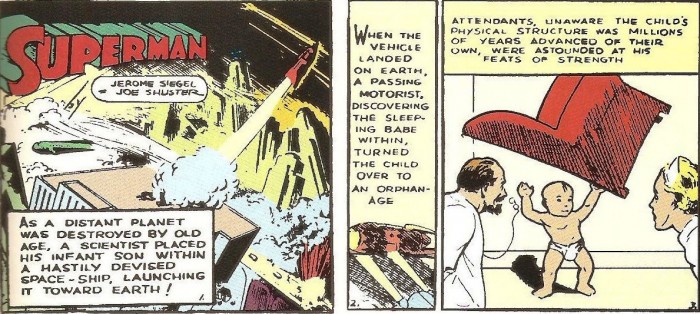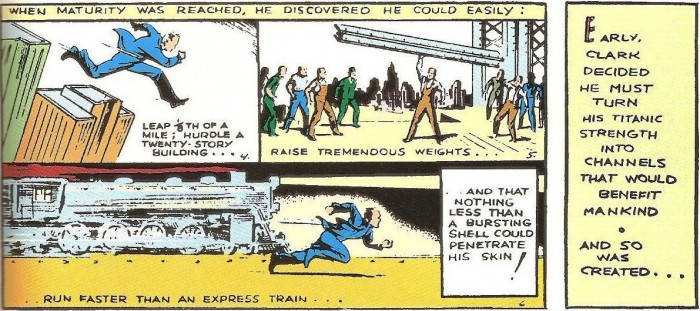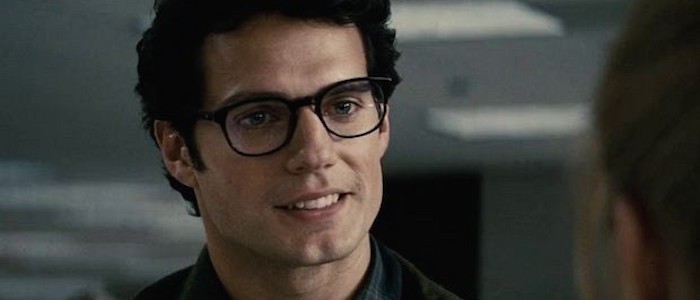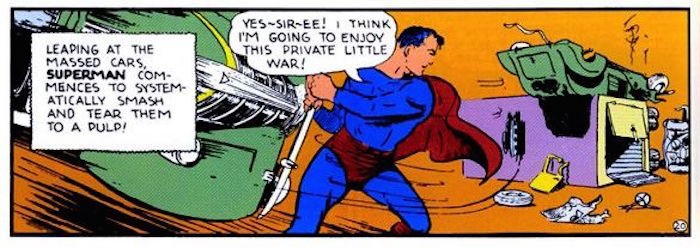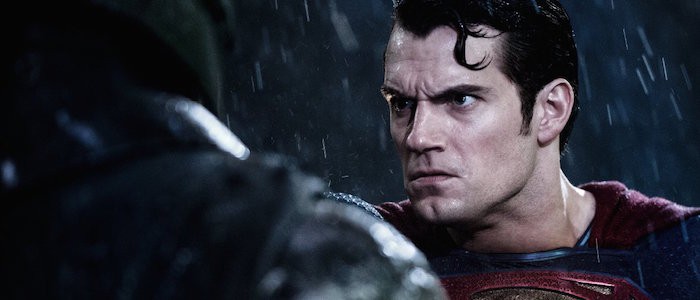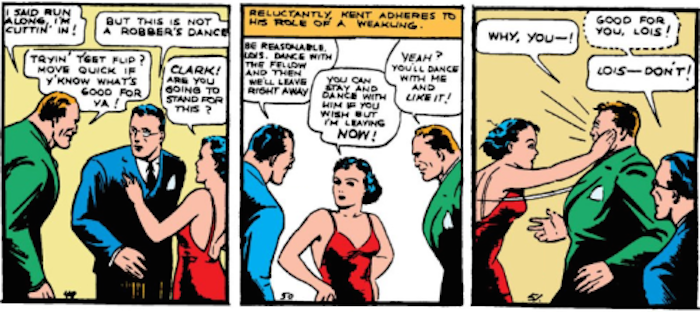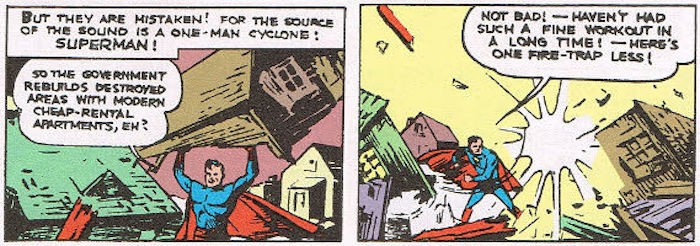Superman V The Golden Age: How Henry Cavill's Man Of Steel Compares To The Original Character
Over the past few days, many people (myself included) have taken Batman v Superman: Dawn of Justice to task for how it chooses to portray its title characters. The superheroes played by Henry Cavill and Ben Affleck don't act like the characters we know and love. Take them out of those classic duds and they'd be unrecognizable.
But we only arrived at our common view of these characters because the decades have shaped them and molded them into that form. Sure, the version of Superman directed by Zack Snyder doesn't act like the Superman most people know, but neither does the original Superman created by writer Jerry Siegel and artist Joe Shuster in 1938. So, in the interest of education, I dove into the oldest Superman tales and read the first year of stories from the original run of Action Comics.
I don't want to write a defense of how Superman is portrayed in Batman v Superman, but I do want to explore how the "Golden Age" version of the character, the original incarnation, is often as different from the accepted version as Snyder's. After all, Clark Kent has been around for 81 years – he's been many different things to many different people.
The Origin Story
The story of how Kal-El left his home planet as an infant and arrived in Kansas is just part of our collective popular culture consciousness now. Everyone knows Superman's origin story, even if they've never picked up a comic book in their life. Everyone knows about Krypton and Smallville, about Jor-El and the Kents. It's just accepted. It's just a fact.
So it's amusing how quickly the first issue of Action Comics skims over Superman's origins, dedicating only three brief panels to where he came from before diving into the action. Krypton isn't named, Kansas isn't specified, Martha and Jonathan Kent are just "a passing motorist," and it is heavily implied that young Clark was raised in an orphanage rather than in a loving home with his adoptive parents. Action Comics #1 has no interest in Superman's mythology because the mythology simply hasn't been invented yet. This issue was published in June of 1938 – the actual details of Superman's journey to Earth and his adoptive parents wouldn't be established until July of 1939 in a quick two-page story.
Compare this to the Superman origin story as portrayed in Man of Steel, which is so familiar with what everyone on the planet knows about this character that it feels compelled to make a number of changes. Kal-El's exodus from Earth now takes place in the midst of a bloody civil war between the Kryptonian government and General Zod. The Kents are no longer the simple, noble figures who name their new child Clark and raise him to want to do good in the world – they're so afraid of what he can be and what the world will think of him that Jonathan Kent dies in a tornado rather than let his super-son save his life. Perhaps the biggest change of all is that Superman's DNA has been infused with the genetic "codex" of his entire race, making him the reason for General Zod and his henchmen to come to Earth in the first place.
The difference between how this story began and where it ended up is remarkable. One is almost too simple, so lacking in details that it raises a hundred different questions. The other is almost too complicated, removing the admirable simplicity of the familiar Superman origin in favor of giving the audience something new and unexpected. Neither are what we're used to and neither represent the story that even your mom and can recite beat-for-beat.
A Super-Powered Skill Set
In the earliest issues of Action Comics, Superman's powers are stripped to the bone. He can "leap 1/8 of a mile" and "hurdle a twenty-story building." He can also run at great speeds and utilize his tremendous strength to bend steel and lift heavy objects, and his skin is tough enough to deflect bullets. A number of his staple abilities are nowhere to be seen: there is no X-ray vision, no heat vision, no freeze breath. He can't even fly (but when he's depicted as leaping through the city or dashing across the countryside, he certainly looks like he's in flight). There is no reference to his powers coming from Earth's yellow sun. As far as the earliest Superman tales are concerned, his powers are simply the result of his alien DNA. Almost all of his abilities stem from the idea that he's just really strong. Everything he does in the first year of Action Comics can be attributed to superhuman muscles and skin.
Interestingly, Man of Steel and Batman v Superman also feature a stripped-down Superman power-set. This character has collected so many abilities and skills over the years that it often feels ridiculous – he's had wacky powers for any and all situations over the years, ranging from telekinesis to super ventriloquism. Henry Cavill's Superman runs with the basics: super strength, indestructible skin, flight, heat vision, and X-ray vision. And, of course, his powers stem from direct exposure to Earth's sunlight. This particular collection of powers is far more vast and varied than the Golden Age Superman, but it's intentionally limited when compared to other versions...which makes it have more in common with the earliest version of the character than most other iterations that have cropped up over the decades.
The Alter Ego
Who is Clark Kent, anyway? In Man of Steel, he's a lone wanderer, an isolated young man who travels the world doing good in secret and trying to find a place in a world where he's essentially a god. He works blue collar jobs and never stays in one place for very long. His lack of an identity is sort of the point – what does an all-powerful being do when he just wants to be like one of us? Batman v Superman moves Clark into more familiar territory, placing him in Metropolis and making him a reporter at The Daily Planet working under editor Perry White. And while he still struggles with who he is and what he's meant to do, most of that skulking and sulking is done while he's in uniform and on the job. As seen by his boss and colleagues, Clark is a lazy reporter who ignores his assignments so he can pursue personal projects and frequently vanishes from the office. Despite being depicted as being a poor, distracted employee, he somehow keeps his job...probably because Batman v Superman knows that Clark Kent has always been a reporter and therefore should remain reporter. Who is Clark Kent? Who knows? He doesn't even know.
The Clark Kent of the Golden Age couldn't be more different. In order to keep anyone from suspecting that he and Superman are one and the same, Clark presents himself as a bumbling, cowardly, meek buffoon to everyone around him. He lets himself be intimidated by goons. He embarrasses himself in front of the woman he loves. He disgraces himself in the offices of The Daily Star (it's not The Daily Planet yet) and stands idly by as his co-workers bully and taunt him. He's not even the mild-mannered ace reporter of later years – he's a total screw-up and a genuinely miserable guy. And yet, Superman seems to have fun playing this version of himself. His inner narration gleefully recounts how no one will suspect that this pushover could possibly be Superman. He seemingly goes out of his way to make Clark seem distasteful and dull and disgraceful. He's playing a role. I'm reminded of that big Superman speech from Kill Bill Vol. 2, which isn't necessarily true for all iterations of the character...but it seems very true here.
Interestingly, Clark Kent the weak-willed nincompoop is still better at this day job than the new cinematic version. Action Comics depicts Clark requesting dangerous assignments that will allow him an excuse to break out the super heroics and he always manages to turn in an article at the end of the day. Movie Clark puts his job on the line to save the day while Golden Age Clark finds a way to let them work in tandem. The result is two very different dynamics that say a great deal about how these characters are being viewed: one is flawed and lost while the other is too perfect for words.
The Definition of Justice
Most versions of Superman, from the pages of the DC comics to Richard Donner's 1978 film to Man of Steel, depict the character as being the planet's first and last line of defense against threats that would otherwise be impossible to stop. He battles alien invasions and rampaging monsters. If he can prevent a natural disaster, he will. If not, he'll show up in the nick of time to rescue as many people as he can. Of course, he also finds time to rescue kittens from trees because Superman is a benevolent god figure. He is Earth's chief protector – when things go wrong, he's on the case. Batman v Superman is aware of this iconography and utilizes it well: Superman rescues victims of a devastating flood, flies to Mexico to pull a little girl out of a burning building, and saves the crew of a disastrous rocket launch. In the eyes of this Superman, justice means allowing people to sleep peacefully at night, to know that someone is looking out for their best interests.
This version of Superman has become the standard. Sure, Zack Snyder's Superman may have a thing for collateral damage (and we'll get to that momentarily), but as far as his films are concerned, his heart is in the right place. He is Earth's representative, an apolitical figure who defends humanity. And that makes the mission statement of Golden Age Superman all the more fascinating. And all the more insane.
Superman emerged from the minds of Jerry Siegel and Joe Shuster during the Great Depression, when President Franklin Delano Roosevelt was radically reshaping the nation to counter devastating unemployment and crippling economic disaster (to say nothing of the war brewing across the Atlantic). Roosevelt was a proud leftist and his policies still feel shockingly liberal by modern standards...and he was elected three times by an American public that adored him. In this context, the Golden Age Superman takes on a new light: he's not the Earth's champion, he's the personification of this era and a warrior for the "New Deal." He doesn't fight aliens and monsters – he represents the downtrodden and the poor and the simple folks who have been abused by big business and broken systems. Whether you agree with the politics on display in the early pages of Action Comics or not, the character is an incredible portrait of a specific time and ideology.
And many of Superman's early foes still fill relevant today. These are the days before Brainiac and Lex Luthor. Instead, Superman battles corrupt government lobbyists and war profiteers. He deliberately traps the owner of a dangerous mining operation in an unsafe mine to convince him to improve safety standards and pay his workers a better wage. He systematically destroys a company that has been selling worthless stock to unsuspecting citizens. He takes an interest in freeing wrongfully accused criminals and rehabilitating street youths. He declares war on reckless drivers after a friend is killed in a hit-and-run accident. He's ruthlessly anti-torture under any circumstance. He even terrorizes an abusive husband to keep him from assaulting his wife. It may dismay a certain dark corner of the internet to learn that Superman, in his original incarnation, was literally a "social justice warrior." The title of his first adventure says everything: "Superman, Champion of the Oppressed."
The more small-scale stories told in early Superman comics have more in common with the pulp adventures of the time than modern superhero tales. This Superman may tear down the corrupt establishment, but it's a personal war, a small war, having more in common with The Shadow and Doc Savage than anything else. Many of these early stories are essentially detective tales where the investigator can smash through a brick wall. Aliens and monsters are still a long way off.
Personal Traits
One thing Golden Age Superman and the Superman of Batman v Superman have in common is that they're both dicks. Seriously. While Superman is commonly portrayed as a noble figure who operates out of kindness and decency, these specific iterations are frequently selfish monsters.
To be fair, they're both selfish monsters in completely different ways. The Superman played by Henry Cavill is a dick because he's a lost soul with no direction in life who picks a fight with Batman for reasons that are never clearly explained. The Superman of 1938 is a dick because he sets his mind to righting a wrong and often doesn't care about what it takes to get it done. Cavill's Superman drags death and destruction with him wherever he goes and seemingly takes out his frustration on that Bat-vigilante who lives next door. Golden Age Superman lets an escaped prisoner get re-captured so he can expose the prison warden as a brutal torturer. Yes, he sits by and photographs the warden torturing the poor guy.
These versions of Superman take things personally. They're jerks. But most importantly, they're so weirdly human in ways that the most well-known iterations of the character are not. Superman began as a blustering tornado, morphed into a saint, and then, when filmmakers decided that he needed a fresh coat of paint, created a flawed version of the character that has more in common with this earliest incarnations of the character than anything else.
The Lady in Superman's Life
I love Lois Lane circa 1938. She's an unapologetically feminist creation: a hard-working reporter who refuses to let men get in the way of a good story and stands up for herself at all times. You can forgive the moments when she's reduced to a damsel in distress because she's so damn tough and ready for an adventure. She sails into war zones, drives toward disasters when other people are fleeing, and even tricks her male colleagues so she can nab a killer scoop instead of them. She's nothing short of remarkable – Lois Lane must do constant battle with every aspect of American society during every waking moment. She's genuinely heroic on her own, but she becomes more important when viewed from 2016. When placed in the proper historical context, she's one of the most willful female characters in all of fiction. She takes shit from everyone, but dishes it back out.
And while she loathes Clark Kent, she loves Superman, frequently going out of her way to track down the mysterious vigilante so she can share a moment with him. What can I say? Lois knows what she wants and she goes for it. Go get him, girl.
Superman himself has an interesting dynamic with Ms. Lane. He's also attracted to her, but will only ever approach her as Clark Kent, who doesn't stand a chance with a woman like this. Just check out the panel above, where Clark meekly lets another man try to cut in on a dance and Lois gives the interloper a slap to the face. Note Clark's reaction: he stays "in character" as a weak pushover, but his inner narration reveals a deep admiration for Lois standing up for herself. While Superman can be casually sexist in the way that so many characters of this time were, he has a welcome feminist streak on occasion – he admires Lois' toughness and ferocity while other men would see it as a turn-off. He can't help but be proud of her when she drugs Clark Kent so she can interview Superman instead of him. She's a tenacious firecracker of a woman.
But I also love Lois Lane circa 2016, even when the movies she's in don't know what to do with her. The version played by Amy Adams has a lot in common with her Golden Age counterpart. She's adventurous and smart and doesn't let politeness get in the way of her nabbing a great headline. She's tough and hardened because that's what her field requires of her. Man of Steel's decision to let her discover Superman's true identity early on is a wonderful choice. She's too smart and too clever to let the truth escape her. It's a shame that Batman v Superman never gives her anything to do (all of her business could have been deleted from the screenplay without consequence), but Adams remains perfect. Smart and capable heroines may be more common now than they were in 1938, but she's keeping this particular touch burning bright.
Reckless and Wanton Destruction
Since the release of Man of Steel in 2013, journalists and fans have grilled Zack Snyder about the film's gruesome, city-leveling climax. Superman's final battle with General Zod is a visual wonder, a superhero fight that is unlike any other put on screen before or since, but it also implies that countless thousands of innocent people perish as the two Kryptonians fling each other through skyscrapers. For a character who has always been a protector, a superhero who stands between the innocent and the evil, it was a controversial and devastating choice. It is, quite frankly, out of character for Superman to let an entire city fall around him.
Out of character for the common version of Superman that we've settled into over the years? Sure. Out of character for Golden Age Superman? Well, that's tricky. Because early Superman has no qualms about causing mass destruction if it means solving a social injustice. Take his above-mentioned war on reckless drivers, where Superman destroys every single vehicle being sold in a used car lot because the owner is selling unsafe jalopies (and presumably destroying the livelihood of the owner in the process). Heck, he even destroys an entire car manufacturing plant because the owner hasn't been constructing safe and reliable vehicles. Once Golden Age Superman sets his sights on a wrong, he will smash it to bits until it can no longer do any harm.
While there are other examples of Superman smashing problems into oblivion, the most jaw-dropping of them comes in Action Comics #8, titled "Superman in the Slums." This issue sums up the Golden Age version of the character better than any other adventure in the first year of Superman. It's nothing short of remarkable. Horrifying and amazing, but remarkable. In this story, Superman prevents a gang of youths from committing a series of robberies and realizes that they are products of their environment. How could they be anything but criminals when they grow up in crime-infested slums? So the man of steel devises an insane plan: he has everyone grab their valuables and flee the area while he smashes the entire neighborhood to bits. The military arrives to stop Superman, but he uses their artillery and bombs to cause further destruction. Soon, the entire area is a pile of rubble.
But Superman's plan worked. Soon, the government steps in and constructs safe, affordable, low-income housing for everyone who was displaced. The chief of police even tells Clark Kent (off the record, of course) that Superman did the right thing. The message here is astonishing. Superman recognizes that criminals are often the product of their environment and that the only way to cure a bad neighborhood of its ills is to have the government step in and assist the people, rather than stand idly by as young people grow up only seeing one way to live their lives. Of course, Superman forces this action by destroying their homes, but he got results.
Superman: leveling cities for the greater good since 1938.

